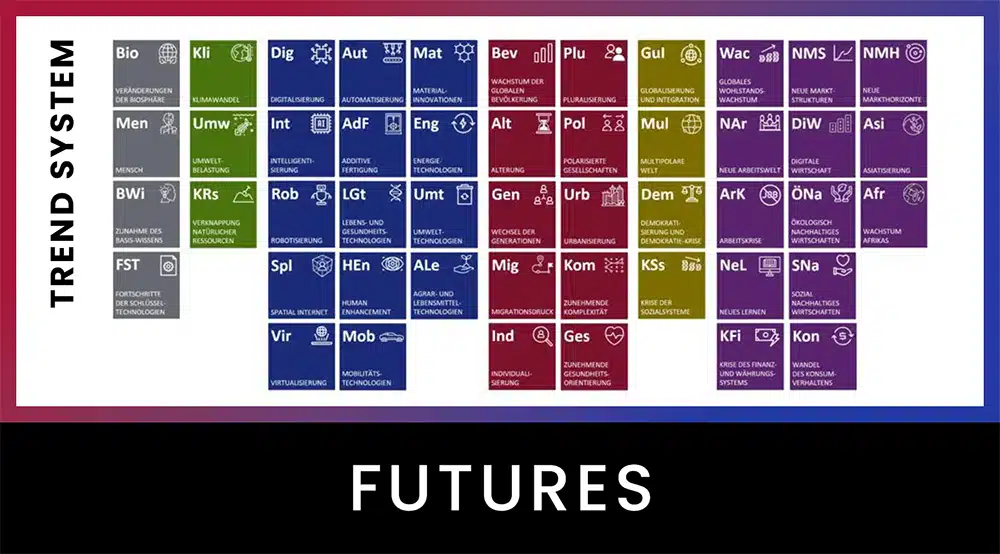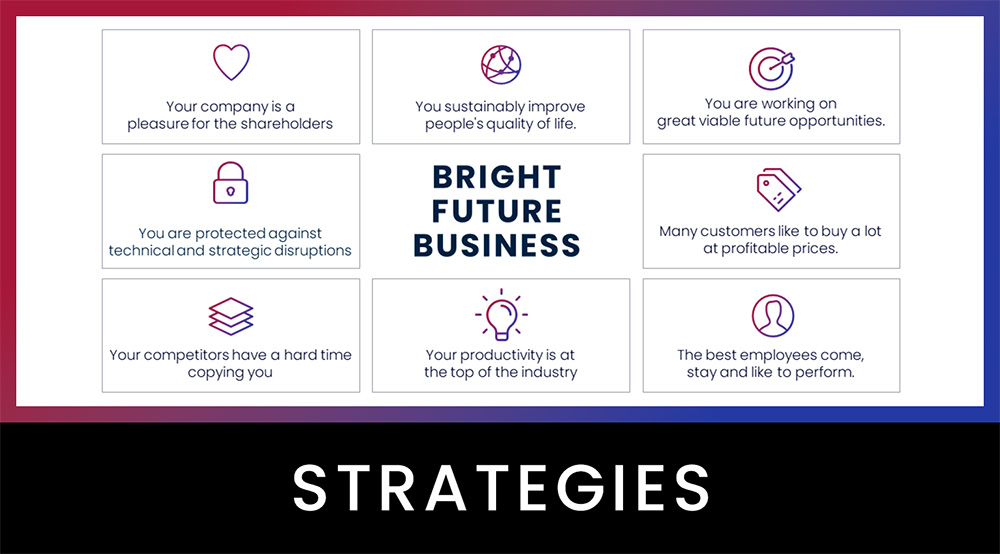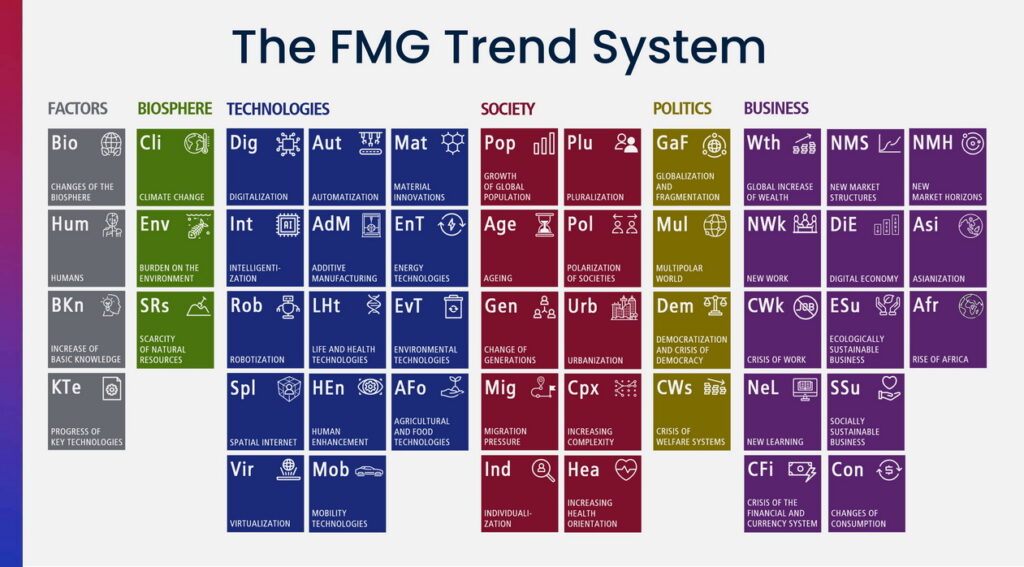Dr. Pero Mićić
There are several reasons for bankruptcy. You’ve come to the right place if you want to future-proof your business and yourself professionally.
Reasons for bankruptcy: Changes as drivers
Nokia had the future assumption that customers would want to choose from many different phone models, and always with a keyboard. As market leaders, they felt unassailable. VW, Mercedes, BMW, General Motors, and virtually all other traditional automakers had the future assumption that electric drives would not be marketable for decades, if ever. An assumption that today even threatens their existence.
How can something like this happen even to world market leaders?
But restaurateurs, retailers, and gym operators also had the future assumption that guests and customers could naturally come to them at any time. A pandemic, as a surprising rupture of their assumptions about the future, was not on the radar screen.
There will be so many changes in the markets over the next few years that it is highly dangerous to have your assumptions about the future only in your gut.
All your strategic decisions are based on assumptions about the future. Therefore, assumptions about the future must be treated critically, logically and rationally. Instead, wishful thinking and emotional repression prevail.
The topic sounds abstract, but what can be more practical than the basis of your economic existence.
Avoiding reasons for bankruptcy – through an early warning system
Yes, no one can predict the future. But there is an early warning system you can use to protect your business and yourself professionally. You’ll find out how in the next few minutes.
You will fail with your business if you misjudge the future of your market. Quite clearly, actually. They overestimate the need, they recognize disruptive technologies or dangerous new competitors too late, then they cannot change course quickly enough and are swept out of the market.
You bet your entire business that your assumptions about the future behavior of your customers, about new competitors, about technologies or regulations are reasonably correct.
And that is why companies fail primarily because of incorrect assumptions about the future. This is the cause of the decline. Only the wrong assumptions about the future lead to sales problems and liquidity problems. Only then will your business become tedious and the daily effort unbearable. If the future assumptions are bad, no matter how ingenious your strategies and how great your resources. You run a high risk of failure.
Most people are not aware of this problem or it is drastically underestimated. Or you think it can’t be helped. But not true.
First of all, what are future assumptions? And do you have any at all?
Every person and every company always has assumptions about the future. How? Don’t you?
Hmm, did you build or rent an office? How long is your contract? Have you purchased any machinery? How long is the useful life? Have you invested in a product? When is the break even? Have you hired any employees? With open-ended contracts? Voilà, you are betting on the future. So yes, you also have assumptions about the future. You have several bets on the future running. You can’t not have future assumptions at all.
And if the market then develops differently than you assumed, you are left with the wrong products, the wrong equipment and the wrong qualified employees. They can then do very well what no one needs anymore.
Future assumptions are your beliefs about what will change and what will stay the same in your market.
Your assumptions about the future are the cornerstones and pillars of your business and job’s existence. Or in other words: They are the strings on which your company hangs.
With any strategic decision, commit to the long term. You can’t undo most of them easily, quickly and cheaply. So you have assumptions about the future.
If you get on the wrong train, you can’t just quickly reverse your decision. If you decide to climb a mountain that doesn’t match your skills, you can’t just jump from one mountain to another along the way. They would first have to go down again, through the valley of crisis. Meanwhile, your competitor has an unassailable lead because his assumptions were better.
Please be aware of this. EVERYTHING, your entire business, is based on assumptions about the future! Again, you are betting your company’s existence on the accuracy of your assumptions about the future. Logical actually.
So far, so good.
One of the main reasons for bankruptcy? A wrong handling of future assumptions!
How do most companies deal with their assumptions about the future? Negligent! The following problems and dangers exist there in practice.
1. you are not even aware of a large part of your assumptions about the future. Therefore, you are flying blind. How can I boldly say such a thing without knowing you? Well, in thirty years I have seen more than a thousand companies and their strategies from the inside. If at all, assumptions about the future are only dealt with in passing, although everything, really everything, is based on them.
Do you have an overview of your future assumptions? No? Then it is high time.
2. The importance of future assumptions for success in career and business is largely unknown or grossly underestimated.
If you think that assumptions about the future are unimportant or if you believe that you just have to let the future come to you, you will not critically examine your assumptions about the future and will therefore take far too high risks.
3. Many believe that nothing can be done about the problem of incorrect assessments of the future.
You can’t predict the future, but you can carefully and permanently check the accuracy of your assumptions about the future in the here and now. This is not fortune telling, but a very practical and existentially important early warning system TODAY.
4. Their assumptions about the future are emotionally colored and therefore tend to be wrong.
Not what is written on the slides are the real future assumptions of your company. But rather the deep-seated beliefs in your emotional limbic system. And that of your managers.
If assumptions about the future are so decisive for life and death, for success and failure of your company, then future assumptions should be developed and tested very critically, analytically and logically, shouldn’t they?
But in fact, if we look at the many tragic cases, this is almost never the case. Rather, a lot of wishful thinking is at work.
Because the brain does not WANT to see change. It would prefer everything to remain as it is. It ignores the signals of change.
And so we have a fat problem. The quality of your assumptions about the future determines the quality of your future. And at the same time, your assumptions about the future are largely unconscious and then even colored emotionally. And that is conceivably dangerous.
But it’s also your opportunity. With a more professional approach to your future assumptions, you can safeguard your business and make it more robust against surprises than your competitors.
How do you better secure your company against surprises now? How do you create an early warning system?
As I said, it’s not about predicting the future. It’s about making your business more future-proof. By recognizing early on when your assumptions about the future are no longer correct. So you have more time to adjust your alignment and strategy.
Professional handling of your future assumptions
1. Identify your existing assumptions about the future.
Simply derive your assumptions from your strategic decisions after the fact.
You’re developing a new product, so you assume there will be a long-term need for it. You closed a location, so assume declining market potential. You decide to enter a new line of business, so you have the future assumption that the market will really exist. You are building a new office building, so assume that many employees will be needed at this location. You’re investing in a new technology, so you assume it won’t soon be made obsolete by another.
Write down the assumptions about the future that underlie each decision you make that commits you to several years down the road.
2. Ask your colleagues and employees about their assumptions about the future.
But don’t tell us what your assumptions about the future are.
I’m pretty sure that if you look at your team’s assumptions, you’ll look at a real mess of thoughts. Anyway, that’s pretty much always the case when a team really talks about future assumptions for the first time.
Everyone considers something else important, calls it something else, values it differently.
Please realize: The existence of your company is based on this chaos of assessments of the future, on these assumptions about the future. This will determine whether you are successful, will just survive, or whether your business will fail.
Our clients are shocked every time they experience this.
And that’s exactly what should happen in your team. The shock will be great enough that you will pay more attention to your assumptions about the future from now on.
3 Play a Business Wargame
Put yourself in the shoes of your competitors, competitors you know today and competitors you can imagine in the future.
Attack your business, try to take away orders and customers from your business through smart strategies and disruptive technologies.
This puts your assumptions to a hard test.
I published a guide for your business wargame some time ago, I link it to you in the show notes.
4. Build yourself a radar system
Give each member of your team the task of keeping one of your future assumptions in mind.
He or she should find out where there is early information on whether the assumption is still soundly based or is faltering.
Ask for information from your employees in team meetings and also in between. This keeps their attention.
In this way, everyone in the team becomes a kind of sensor and constantly checks future assumptions without any effort.
With these four measures, you can make your company a good deal more future-proof.
Later you can expand your radar system. With scenarios and with a trend system. You can use our trend system for this purpose free of charge. There is a post about this, which I’ll link to in the description.
If it’s too much trouble for you to make your assumptions about the future more solid on your own, we’re happy to do it together. We’ve been doing this kind of thing for 30 years.
Placeholder
Please also follow these links:
► Free video crash course THE FUTURE OF YOUR BUSINESS
► BUSINESS WARGAMING for robust business and future opportunities
► LECTURES AND KEYNOTES by Pero Mićić for your employees and customers
Placeholder
I wish you a bright future!
Have a bright future!
Placeholder


































